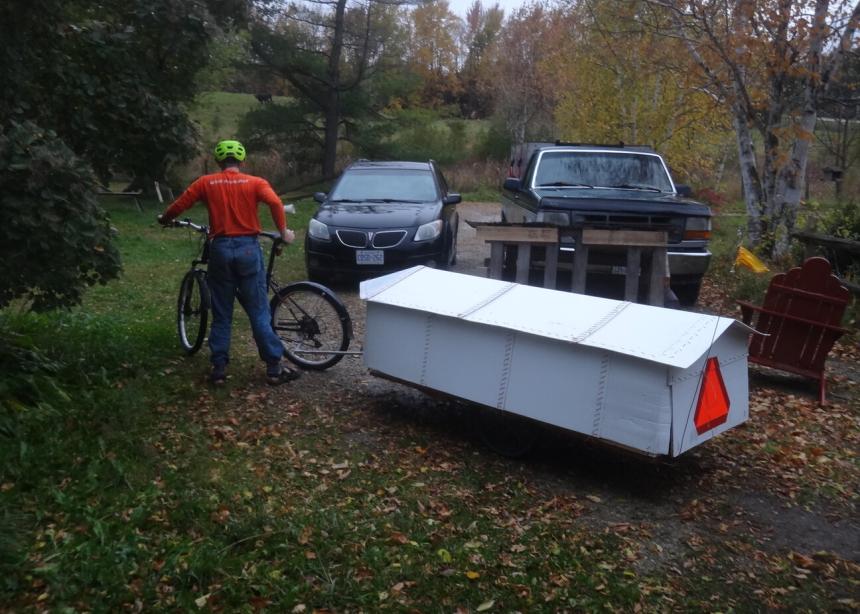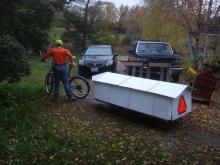The following article is an online supplement to Miles Wiederkehr’s article, “A cycle of practical love” in the Sept. 22, 2023, issue of Canadian Mennonite.
In “A cycle of practical love,” my dad mentions the idea of trying to personally take on the energy cost of living. What does it cost to feed a university student? During my third year at Conrad Grebel University College, I decided to find out.
For the previous few years, I had been working with my family toward growing our own food and weaning ourselves off of fossil fuels in that work. I had switched from car to bike for my own transportation. In my third year at Grebel I would be cooking for myself, so I decided I would combine those two things in an experiment in human-powered transport of a complete local diet for the eight-month school year.
When I pulled out of the driveway on the morning of September 4th, 2020, I knew it would be a long day; Grebel is 90 kilometres southeast of my home. I was pulling 250lbs of home-grown food and personal belongings. Including myself, my bike and trailer, my rig came to about a quarter ton. Rolling that down the road means a different kind of biking.
The trailer dragged me to a gasping bottom gear on climbs and pushed alarmingly downhill. The trip took about ten hours (including a 45-minute stop to fix a tire that exploded like a gunshot as I was passing through one town). On arrival I was left very sore. I experienced a flared-up, clicking knee for a few days.
That was the first trip. I had taken 100lbs of personal belongings (including a 20lb harp), and I needed a lot more than 150lbs of food. So I did it all over again (minus the tire!) during my October reading week.
In actuality I did not just eat my own food. I shared some meals with apartment mates, and ate meals they shared. And I had the occasional meal in the cafeteria when pandemic restrictions allowed. So I did not get to, or have to, experience the undiluted psychological effects of a diet restricted by being highly localized and lightweight. Still, I had some extra flour and dried greens at the end of the year, so I think I can say that the 400lbs of food I took was enough to support one person for eight months.
My experiment was helpful in several ways:
- It kept me from using a lot of fossil fuels that would otherwise have been needed to feed me, and illustrated what that transportation cost looks like in terms of labour.
- It pushed me to change my eating habits to fit what can be grown locally and to budget my food. It showed me (and my apartment mates) that a complete diet can be grown here.
- It provided me with a sense of grounding in the midst of a disorienting time, as I really knew where my food came from.
- It made me appreciate my food even more than before. My prayers at the start of meals were deeply grateful. I broke my habit of reading while eating. And I obsessively licked every dish. I had worked for it and wasn’t going to waste it!
What I did was difficult. The bike trips were exhausting and strenuous. While the experience was helpful in getting a sense of the cost of how I was living, I realized that I still hadn’t experienced the full cost.
- To complete my nutrient cycle, I would have had to not only take my food to school but also bring my humanure compost home.
- I’m no athlete, but I’m fitter and more able than average. I’m pretty sure that many people couldn’t do what I did. Scaling this system to the population level would require the most able people to help out several others.
- There are non-food costs to living too, like heating and cooking fuel, and I didn’t work on most of those. All this would mean a lot more work. My family was also subsidizing me by doing extra work at home to keep our food system running.
Is such a system fair and worthwhile? For whom and to support what?
Some would say that, at 90 km, my food was local. For me, this experiment showed that even that distance is still very costly. Living that far from what supports your life is inefficient. For me, it was an extravagance. Now when I take 250 lbs of compost buckets across our yard at home, I’m glad to not be trying to carry that extravagance on my shoulders too.
Related articles:
A cycle of practical love
Humans and Humus




Add new comment
Canadian Mennonite invites comments and encourages constructive discussion about our content. Actual full names (first and last) are required. Comments are moderated and may be edited. They will not appear online until approved and will be posted during business hours. Some comments may be reproduced in print.